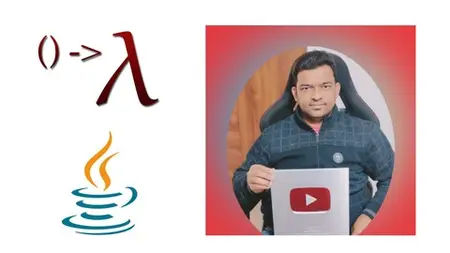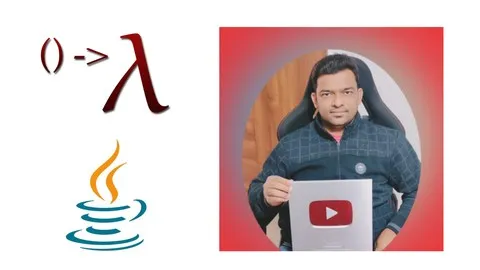Functional Programming In Java
Published 2/2025
MP4 | Video: h264, 1920x1080 | Audio: AAC, 44.1 KHz
Language: English | Size: 2.95 GB | Duration: 9h 52m
Published 2/2025
MP4 | Video: h264, 1920x1080 | Audio: AAC, 44.1 KHz
Language: English | Size: 2.95 GB | Duration: 9h 52m
Master Java Lambda Expressions, Functional Interfaces, Stream API and Collections Framework. Write Clean & Concise Code
What you'll learn
Functional Programming Concepts
Learn everything about Lambda Expressions
Functional Interfaces - Function, Predicate, Supplier, and Consumer
Functional Interfaces - BiFunction, BiPredicate, and BiConsumer
Functional Interfaces - UnaryOperator and BinaryOperator
Learn Primitive Functional Interfaces with Examples
Stream API - filter, map, flatMap, sorted, collect, forEach, distinct, limit, skip, count, min, max, anyMatch, allMatch, noneMatch
Covered Real-World Use Cases
Java Stream Programs for Beginners (Interview Preparation)
Learn everything about Java Optional Class
Learn everything about Java Method References
Requirements
Basic Java programming knowledge required
Good know using IntelliJ IDEA IDE
Description
Are you looking to enhance your Java skills with functional programming? Do you want to write cleaner, more efficient, and more maintainable code? If so, this course is for you! Functional Programming in Java is designed to help Java developers transition from imperative to functional programming paradigms using lambda expressions, functional interfaces, and the Java Stream API.By the end of this course, you’ll not only understand the theoretical foundations of functional programming but also gain hands-on experience with real-world coding examples. Whether you're a beginner looking to explore functional programming or an experienced developer seeking to refine your skills, this course provides everything you need to master Java’s modern functional programming capabilities.What is Functional Programming?Functional programming is a declarative way of writing code that focuses on what to do rather than how to do it.It avoids changing state and mutable data.Functions are treated as first-class citizens.It makes code more concise, predictable, and easier to test. Java has embraced functional programming since Java 8, introducing features like lambdas, functional interfaces, streams, and method references.What You Will LearnThis comprehensive course covers everything from the fundamentals of functional programming to advanced topics, ensuring you develop a strong understanding of lambda expressions, functional interfaces, and Java Streams. You will explore:Introduction to Functional ProgrammingUnderstanding the paradigm shift from imperative programming to functional programmingHow functional programming improves code readability, reusability, and scalabilityPure Functions in Functional ProgrammingFunctions as First-Class Objects in Functional ProgrammingHigher-order Functions in Functional ProgrammingRules of Pure Functional ProgrammingLambda Expressions in JavaThe power of anonymous functionsWriting clean and concise code using lambda expressionsPractical examples and use cases of lambda functionsFunctional Interfaces in JavaUnderstanding built-in functional interfaces: Function, Predicate, Supplier, and ConsumerExploring BiFunction, BiPredicate, and BiConsumer for handling multiple argumentsWorking with UnaryOperator and BinaryOperatorPrimitive Functional InterfacesSpecialized interfaces for handling primitive types like int, long, and doubleHow these interfaces optimize performance in functional programmingJava Stream APIIntroduction to Streams and Pipelines for Efficient Data ProcessingUsing filter(), map(), flatMap(), and sorted() for data transformationApplying collect(), foreach(), distinct(), limit(), and skip()Aggregation techniques using count(), min(), max()Handling conditions with anyMatch(), allMatch(), and noneMatch()Java Stream Programs for BeginnersOptional Class to handle null pointer exceptionsMethod ReferencesWhy Learn Functional Programming in Java?Functional programming is becoming increasingly important in modern software development. Major Java versions (Java 8 and later) have embraced functional programming concepts, making it an essential skill for Java developers. Here’s why you should learn it:Write Less Code: Lambda expressions and streams reduce boilerplate codeImprove Readability: Functional code is easier to read and maintainBoost Performance: Streams allow parallel execution, making applications fasterAdopt Modern Java Practices: Functional programming is widely used in Spring, Hibernate, and Java frameworksIncrease Career Opportunities: Companies seek developers proficient in functional programmingCourse Features & Benefits100% Practical Learning – Hands-on coding with real-world scenariosClear & Concise Explanations – No unnecessary theory, only what you needStep-by-Step Guidance – Learn through structured modules and examplesTaught by Experienced Instructors – Get insights from Java professionalsLifetime Access & Updates – Stay up to date with modern Java trendsQ&A Support – Get help whenever you needGet Started Today!Functional programming is the future of Java development, and mastering it will boost your coding skills and career opportunities. Whether you're a beginner or an experienced developer, this course will empower you with the knowledge and tools needed to write better Java code.Start Learning Today! Join now and become an expert in Functional Programming in Java.
Overview
Section 1: Introduction
Lecture 1 What is Functional Programming
Section 2: Introduction to Functional Programming
Lecture 2 Section Overview
Lecture 3 Pure Functions in Functional Programming
Lecture 4 Functions as First-Class Objects in Functional Programming
Lecture 5 Higher-Order Functions in Functional Programming
Lecture 6 Rules of Pure Functional Programming
Section 3: Lambda Expressions
Lecture 7 What is Lambda Expression
Lecture 8 Lambda Expression with Example
Lecture 9 Lambda Expression - Calculator Example
Lecture 10 Pass Lambda as Parameter Example
Lecture 11 Lambda Expression Runnable Example
Lecture 12 Sort Employee Objects by Salary using Lambda in Ascending and Descending Order
Section 4: Functional Interfaces - Introduction
Lecture 13 Introduction to Functional Interfaces
Section 5: Functional Interfaces - Function
Lecture 14 Understanding Function Interface with Example
Lecture 15 Function andThen() Method with Example
Lecture 16 Function compose() Method with Example
Lecture 17 Function identity() Method with Example
Section 6: Functional Interfaces - Predicate
Lecture 18 Understanding Predicate Interface with Example
Lecture 19 Predicate and() Method with Example
Lecture 20 Predicate or() Method with Example
Lecture 21 Predicate nagate() and isEqual() Methods with Example
Section 7: Functional Interfaces - Supplier
Lecture 22 Understanding Supplier Interface with Example
Lecture 23 Supplier - Real-World Use Case Example
Section 8: Functional Interfaces - Consumer
Lecture 24 Understanding Consumer Interface with Examples
Section 9: Functional Interfaces - BiFunction
Lecture 25 Understanding BiFunction with Example
Lecture 26 BiFunction andThen() Method with Example
Lecture 27 BiFunction - Calculate the Area of Rectangle
Section 10: Functional Interfaces - BiPredicate
Lecture 28 Understanding BiPredicate Interface with Example
Lecture 29 BiPredicate and() Method with Example
Lecture 30 BiPredicate or() Method with Example
Lecture 31 BiPredicate nagate() Method with Example
Section 11: Functional Interfaces - BiConsumer
Lecture 32 Understanding BiConsumer with Example
Lecture 33 BiConsumer andThen() Method with Example
Section 12: Functional Interfaces - UnaryOperator and BinaryOperator
Lecture 34 UnaryOperator Interface with Examples
Lecture 35 BinaryOperator Interface with Examples
Section 13: Primitive Functional Interfaces
Lecture 36 Introduction to Primitive Functional Interfaces
Lecture 37 IntPredicate, LongPredicate, and DoublePredicate Interfaces
Lecture 38 IntFunction, LongFunction, and DoubleFunction Interfaces
Lecture 39 IntConsumer, LongConsumer, and DoubleConsumer Interfaces
Lecture 40 IntSupplier, LongSupplier, and DoubleSupplier Interfaces
Section 14: Java Stream API - Introduction
Lecture 41 Introduction to Java Streams
Lecture 42 Java Stream Pipeline
Lecture 43 Types of Stream Operations
Lecture 44 Create Stream Objects - Different Ways
Section 15: Java Stream API - filter
Lecture 45 Java Stream filter() Method Example 1
Lecture 46 Java Stream filter() Method Example 2
Lecture 47 Real-World Use Case - Java Stream filter() Method Example 3
Section 16: Java Stream API - map
Lecture 48 Understanding Stream map() Method
Lecture 49 Stream map() Method Example
Lecture 50 Real-World Use Case - Retrieve Emails from List of Users using map() Method
Lecture 51 Real-World Use Case - Convert One Object into Another Object (Entity to DTO)
Section 17: Java Stream API - flatMap
Lecture 52 Understanding Stream flatMap Method
Lecture 53 Stream flatMap() Method Example
Section 18: Java Stream API - sorted
Lecture 54 Understanding Stream sorted() Method with Example
Lecture 55 Stream sorted() Method Example - Sort List of Strings in Asc and Desc Order
Lecture 56 Stream sorted() Method Example - Sort User By Age in Asc and Desc Order
Lecture 57 Stream sorted() Method Example - Sort the Products by Price in Asc & Desc Order
Lecture 58 Stream sorted() Method - Sort Products by Price and Name in Asc and Desc Order
Section 19: Java Stream API - collect
Lecture 59 Understanding Stream collect() Method
Lecture 60 Stream collect() Method Example
Lecture 61 Stream collect() Method Example - Collecting Employee Names to List
Lecture 62 Stream collect() Method Example - Counting the Elements of a Stream
Lecture 63 Group Products by Category using collect(Collectors.groupingBy()) Method
Section 20: Java Stream API - foreach and distinct
Lecture 64 Stream forEach() Method with Example
Lecture 65 Java Stream distinct() Method with Example
Lecture 66 Real-World Use Case of distinct() Method - Remove Duplicate User Objects
Section 21: Java Stream API - limit and skip
Lecture 67 Java Stream limit() Method with Example
Lecture 68 Java Stream skip() Method with Example
Section 22: Java Stream API - count, min, and max
Lecture 69 Stream count() Method with Example
Lecture 70 Using count() method with filter() Example
Lecture 71 Stream min() Method with Example
Lecture 72 Stream max() Method with Example
Section 23: Java Stream API - anymatch, allmatch, and nonematch
Lecture 73 Java Stream anyMatch() Method with Example
Lecture 74 Java Stream allMatch() Method with Example
Lecture 75 Java Stream noneMatch() Method with Example
Section 24: Java Stream Programs
Lecture 76 Java Stream Program to Find the Frequency of Each Character in a Given String
Lecture 77 Java Stream Program to Find the Maximum Number and Minimum Number in a List
Lecture 78 Java Stream Program to Find the Second Largest Number in the List of Integers
Lecture 79 Java Stream Program to Find the Sum of All Digits of a Number
Lecture 80 Java Stream Program to Print Even Numbers from a List
Lecture 81 Java Stream Program to Remove Duplicate Elements from a List
Lecture 82 Java Stream Program to Find the Average of a Given List of Numbers
Lecture 83 Java Stream Program to Reverse Each Word of String
Lecture 84 Java Stream Program to Sort the List of Strings in Ascending & Descending Order
Lecture 85 Java Stream Program to Find the Square of the First Three Even Numbers
Lecture 86 Java Stream Program to Convert a List of Strings to Uppercase and Lowercase
Lecture 87 Collectors groupingBy - Group Employees By Age
Java Beginners: If you have basic Java knowledge and want to explore modern features like lambdas and streams.,Experienced Developers: If you’re looking to write cleaner, more efficient code and enhance your coding style.,Professionals: Anyone working on projects where Java 8+ is used and functional programming concepts are required.



